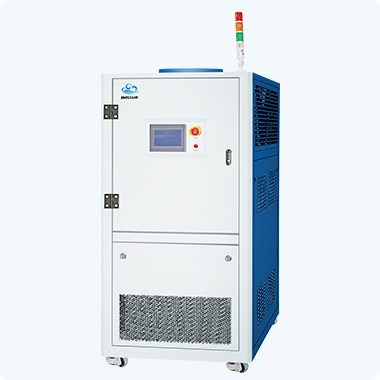Future trends in the lithium battery energy storage industry: liquid cooled test machines enable sustainable development
With the rapid development of science and technology, energy storage technology has become an indispensable part of modern society. Among them, lithium battery energy storage technology has attracted much attention for its high cost performance, long life and wide application fields. However, lithium batteries will generate a lot of heat during the charge and discharge process, and if they are not dissipated in time, they may lead to thermal runaway or even fire. Therefore, an efficient and safe cooling system is crucial for lithium battery energy storage equipment.
The liquid cooling test machine is an advanced cooling equipment for this need. It takes away the heat generated by the battery quickly by means of liquid convection heat transfer to ensure that the battery operates within a safe temperature range. Compared with the traditional air cooling system, the liquid cooling system has significant advantages in heat dissipation efficiency, temperature difference control and fluid temperature flow control.
First of all, the cooling efficiency of the liquid cooling system is much higher than that of the air cooling system. Since the thermal conductivity of liquid is much higher than that of air, the liquid cooling system can transfer the heat generated by the battery more quickly, effectively preventing the battery thermal runaway.
Secondly, in terms of temperature difference control, the liquid cooling system performs better. By precisely controlling the temperature and flow of the fluid, the liquid cooling system ensures that the temperature difference between the batteries is kept within a small range, thereby improving the performance stability of the entire energy storage system.
In addition, fluid temperature and flow control in liquid cooling systems is relatively simple. Compared with the complex duct design of air cooling systems, liquid cooling systems are easier to achieve precise temperature and flow control, thus simplifying the design and maintenance process of the entire cooling system.

In terms of safety, the liquid cooling system also performs well. Although the liquid cooling system has the risk of leakage, this risk can be effectively avoided through reasonable structural design and strict production process control. At the same time, due to the efficient heat dissipation performance of the liquid cooling system, the battery life using liquid cooling is longer, further improving the overall safety of the energy storage system.
It is worth mentioning that the liquid cooled test machine has been widely used in the field of new energy vehicles. With the continuous expansion of the new energy vehicle market and the increasing maturity of technology, the application of liquid cooled test machines will also be further expanded to more fields.
According to the demand characteristics and development trends of the lithium battery energy storage industry, the liquid cooling test machine is undoubtedly an ideal cooling solution. It not only improves the performance and safety of energy storage systems, but also injects new vitality into the sustainable development of the industry. Looking to the future, with the continuous progress of technology and the continuous growth of market demand, the application prospects of liquid cooled test machines in the lithium battery energy storage industry will be broader.
Energy storage liquid cooling temperature control technology application advantages
How to derive the test results of high and low temperature coolant tester
High and low temperature coolant test electrical source circuit connection method
The problem of water source during the use of high and low temperature coolant testing machine
Coolant filling and discharging method of battery module high and low temperature liquid cooling test machine
High and low temperature liquid cooling test machine solutions
